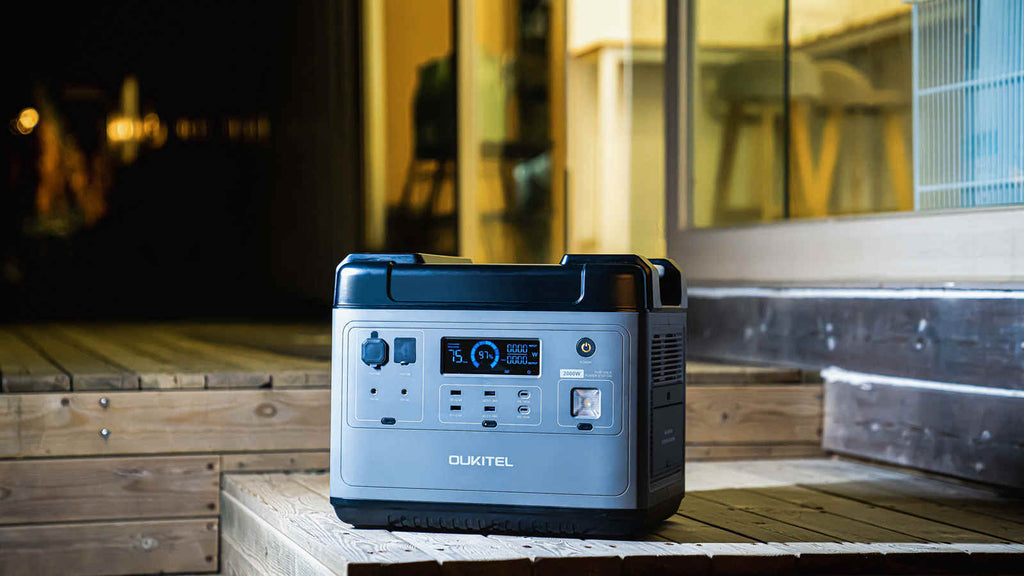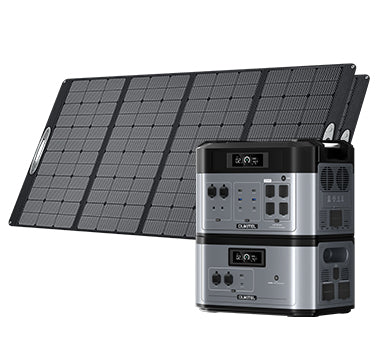Portable Power Stations: The Ideal Solution for Brownouts
Navigation
- Introduction
- What is a Brownout?
- The Impact and Risks of Brownouts
- How to Tackle Brownouts?
- How Portable Power Stations Help During Brownouts?
- Advantages of Portable Power Stations Over Generators
- How to Choose the Right Portable Power Station?
- Conclusion
Introduction
Brownouts are common but inconvenient, leading to disruptions in our daily lives and affecting the performance of our electrical appliances. One efficient solution to combat this issue is the use of portable power stations. In this article, we'll discuss the nature of brownouts, their impact, and how portable power stations can be the ideal solution for overcoming them.

What is a Brownout?
A brownout is a temporary reduction in voltage in an electrical power supply system, causing a drop in the available power. This can lead to flickering lights, reduced appliance performance, and even damage to sensitive electronic devices.
The Impact and Risks of Brownouts
Brownouts, although often brief and less severe than blackouts, can cause a significant impact on both residential and commercial environments. The effects can range from minor annoyances to substantial disruptions or even damage:
- Disruption of Daily Routines and Work Schedules: In households, brownouts can disrupt daily routines, from cooking and cleaning to personal entertainment. In businesses, especially those relying heavily on electrically-powered machinery or computer systems, such as manufacturing plants or data centers, brownouts can lead to work stoppages, decreased productivity, and financial loss.
- Reduced Performance and Lifespan of Electrical Appliances: Brownouts can cause appliances to run inefficiently. Motors in appliances like refrigerators, air conditioners, or fans might strain under low voltage, leading to increased wear and tear and a shorter lifespan. This may result in higher maintenance costs or the need for premature replacement of appliances.
- Potential Damage to Sensitive Electronic Devices: Electronic devices like computers, smartphones, and other gadgets are susceptible to voltage fluctuations. Brownouts can cause data loss, hardware damage, and other malfunctions. This risk is particularly concerning for businesses with large data centers or for individuals who work from home.
You may also want to read: Can Portable Generators Get Wet?
How to Tackle Brownouts?
There are several measures that individuals and businesses can take to mitigate the effects of brownouts:
- Unplugging Non-Essential Appliances: When a brownout occurs, reducing the load on the electrical grid can help. Unplugging non-essential appliances like microwaves, space heaters, or decorative lighting can ensure that more critical appliances receive the necessary power.
- Upgrading to Energy-Efficient Appliances or Installing Voltage Stabilizers: Energy-efficient appliances often work better under conditions of reduced voltage, making them less likely to be affected by a brownout. Voltage stabilizers can help maintain a constant voltage level for appliances, protecting them from voltage fluctuations.
- Using Backup Power Sources: For businesses and individuals who can't afford interruptions due to brownouts, backup power sources such as generators, uninterruptible power supply (UPS) systems, or portable power stations can be a lifeline. These devices can provide power during a brownout, allowing for the continued operation of critical appliances and devices.
Related: Power Surges Home Protection: Why You Need a UPS System?
How Portable Power Stations Help During Brownouts?
Portable power stations provide a reliable source of power during brownouts, ensuring the proper functioning of your essential devices. They can be used to power a variety of appliances, such as lights, fans, laptops, and smartphones, keeping you connected and comfortable during power fluctuations.
Advantages of Portable Power Stations Over Generators
Compared to traditional generators, portable power stations offer several benefits during brownouts:
- Quiet operation: Portable power stations run silently, unlike generators, which can be noisy and disruptive.
- No emissions: As they use batteries, portable power stations do not produce harmful emissions, such as carbon monoxide.
- Compact and lightweight: They are easy to carry and store, making them ideal for use at home or on the go.
- Low maintenance: Portable power stations require minimal maintenance, unlike generators that need regular fueling and upkeep.
How to Choose the Right Portable Power Station?

When selecting a portable power station, consider the following factors:
- Power Output: The power output, measured in watts, is one of the most important factors to consider. The power station should be able to provide enough wattage to run your desired devices. Look at the power specifications of your devices to determine how much power you'll need. Remember to consider both the running watts (power needed to keep the device operating) and starting watts (extra power needed to start the device) where applicable.
- Weight: While portable power stations are typically designed to be compact and lightweight, there can be a significant difference in weight between different models. If portability is a key concern, opt for a lighter model that won't be burdensome to carry. However, keep in mind that higher-capacity models will generally be heavier due to larger batteries.
- Price: Portable power stations come in a wide range of prices depending on their power output, battery capacity, and additional features. Set a budget before shopping and consider which features are essential to you. Higher-priced models often come with more power and extra features, like a variety of output ports or faster recharging capabilities. But don't forget that even lower-priced models can still offer solid performance and meet basic power needs.
- Battery Capacity: This tells you how much power the station can store and is typically measured in watt-hours (Wh). A larger capacity means the power station can run your devices for a longer time before it needs recharging. Be sure to assess your power needs and consider how long you might need the power station to operate during a brownout or power outage.
- Recharging Options: Consider how the power station can be recharged. Most can be recharged via an AC outlet, but some models also allow for recharging via a car's 12V socket or even solar panels. Having multiple recharging options can provide added flexibility, especially during extended power outages or outdoor use.
- Output Ports: Check what types of output ports the power station includes. Ensure it has the right types and sufficient numbers of ports for your devices. Common output ports include AC outlets, USB ports (including USB-C for newer devices), and DC ports.
Conclusion
In conclusion, portable power stations play an essential role in helping us survive brownouts by providing a reliable, convenient, and eco-friendly power source. By considering factors such as power output, weight, and battery capacity, you can select the perfect portable power station to suit your needs during power fluctuations. So, invest in a portable power station today and be prepared for the next brownout.







































 Oukitel Flashlight
Oukitel Flashlight Oukitel Solar
Extension Cable
Oukitel Solar
Extension Cable

















Leave a comment